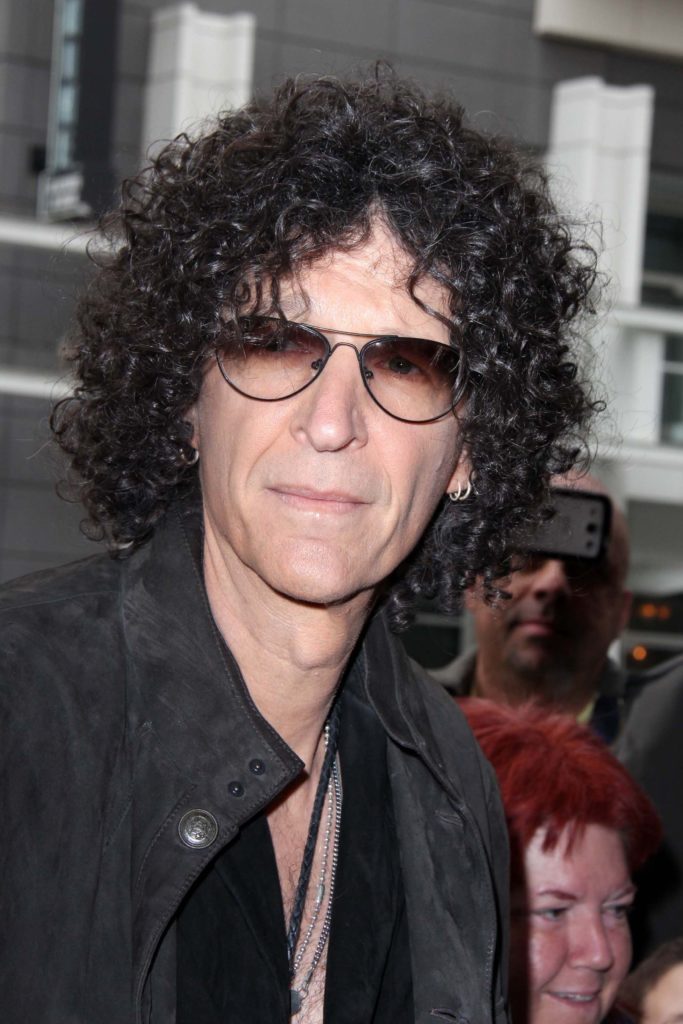
In what seems like a lifetime ago, Howard Stern was tearing rock radio up, igniting morning drive in markets as diverse as Washington, D.C., Los Angeles, and Syracuse, NY.
In the late ’80s, Howard, along with Robin, Jackie, Fred, and Gary lit up the commercial radio airwaves, causing great consternation for the FCC, as well as station owners – whether they were competing against Stern or had him on their stations.
The reasons for Stern affiliates to be uncomfortable were several. They were concerned Howard’s antics would instigate sizable fines, as well as land them on “Do not buy” agency lists. And then there was the issue of Stern’s bonuses. Super agent Don Buchwald easily negotiated whopping performance incentives the show often blew through. If their sales were flagging, paying a six-figure bonus could be debilitating.
I remember working in a market that was ripe for Stern’s antics. The show was an instant hit, and our Arbitron monthlies were pointing up. After two strong months, I was talking with one of the owners about how well Stern was doing, and he confided in me he was praying for a bad third month. I asked him why in the world he was betting against his own station, and he told me flat-out Stern’s bonus would be debilitating to the station because of sales issues.
It was also at that time it started becoming obvious to me that researching a Stern station could be problematic at best, and deceiving at worst. When you asked consumers for their favorite station – a standard question in every perceptual study – if they chose WXRK or WYSP or WNCX, you were left with confusing information.
Were they choosing the station for Stern, the music, or both?
So, that became the required follow-up question that got added to every research study. It became known as “the Fred Jacobs memorial question.” (I actually preferred it being called “the Fred Jacobs honorary question” for obvious reasons).
And it worked. It clearly illustrated whether the music and Stern had any compatibility. And it also informed us about whether the music and local personalities were contributing in a significant way to the station’s success. I have added it to countless other perceptual studies, especially in circumstances where the morning show is a high performer.
It tracks nicely over time. If you get an “annual physical” – a perceptual study – you can watch those trendlines. When Stern’s appeal reached a certain level, we knew we really didn’t have a music format or even a radio station. We had a highly popular morning show.
And when Stern left his terrestrial roots back in 2006, it left many of his former affiliates with a dilemma they could not overcome.
![]() So lately, I’ve been thinking a lot about that question, and its relevance to broadcast radio as it attempts to get past the pandemic.
So lately, I’ve been thinking a lot about that question, and its relevance to broadcast radio as it attempts to get past the pandemic.
To what degree are listeners tuning in for radio’s personalities, hosts, and shows? And in a world where Spotify, Apple, Amazon, and SiriusXM are providing music services, how is local radio competing in that highly charged subscription environment?
That’s why our Techsurvey 2021 results have been especially valuable this year. Last year’s study was fielded in January/February 2020 – just before the pandemic and the subsequent lockdown rocked our worlds. Our new study clearly reveals how habits and priorities have changed – and what they mean to radio broadcasters as we enter (hopefully) the “recovery phase” of COVID.
My favorite chart in Techsurvey attempts to answer the question, “Why AM/FM radio?” We give respondents a long list of potential reasons why they opt for broadcast radio (over other options) – and we ask them to identify the main driver for choosing a regular radio station.
Often when I show this chart, I focus on the “emotional underpinnings” of radio’s appeal – qualities like companionship, mood elevation, or escape. But on the version below, I’ve highlighted the radio fans who point to music as a main factor for listening to broadcast radio versus those who point to personalities, shows, and hosts:
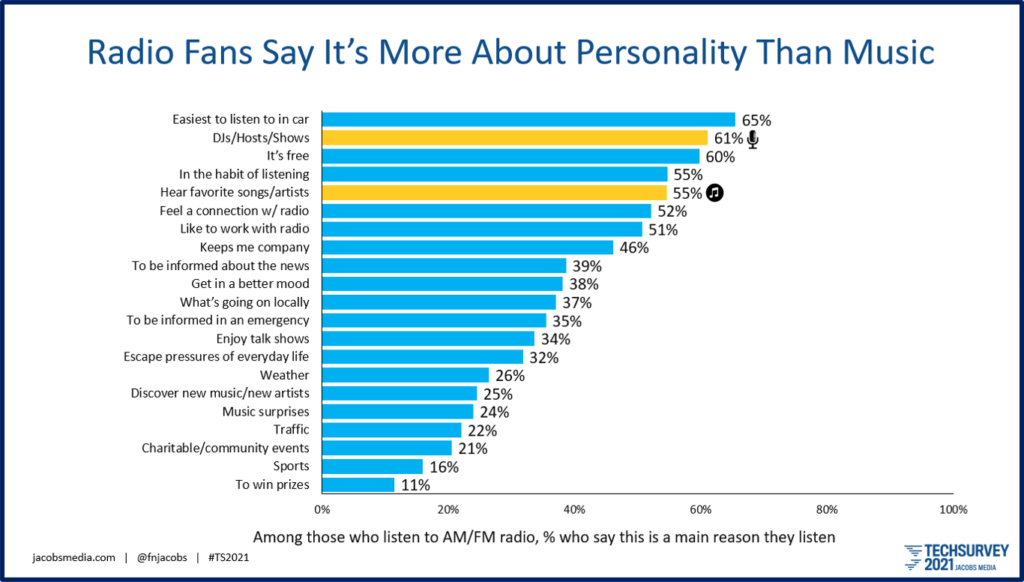
Like most research findings, there’s perspective to be gained in looking at data points over time. And fortunately, we’ve been asking these same questions over many years.
In comparing those who say music is a main driver in listening to AM/FM radio versus those who say personalities are part of the secret sauce, an unmistakable trend has emerged:
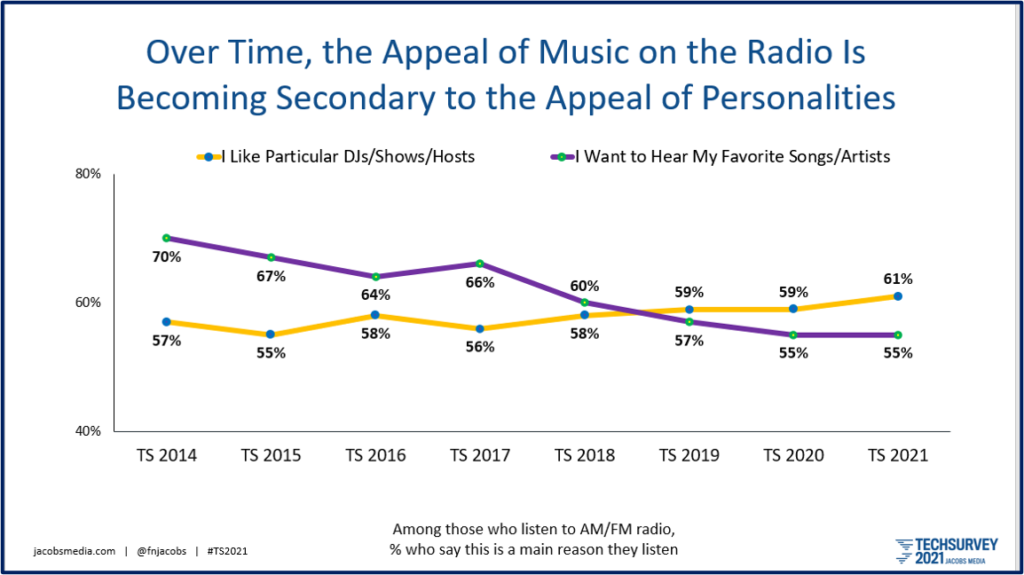
Now many variables could be impacting these results, especially a growing presence of fans of spoken word formats in Techsurvey. That said, however, two-thirds of fans of CHR, Urban AC, and Rock stations choose DJs, hosts, and shows as main drivers of broadcast radio.
And in the big picture, that makes a great deal of sense. Music has become commoditized and ubiquitous, available on umpteen streaming services, as well as on satellite radio, your cable or dish system, and your Bluetooth speaker system. It seems like in recent years, seemingly everyone has become a music radio programmer.
But it’s personalities that have become highly proprietary. They are the difference-makers for so many radio stations. And they’re the reason why more and more companies seek strong, habit-forming personalities, shows, and hosts in dayparts outside of morning drive. It’s also why syndicated talent has become so important in recent years. Anybody can duplicate your music, but its the people behind the mic that are your “secret sauce.”
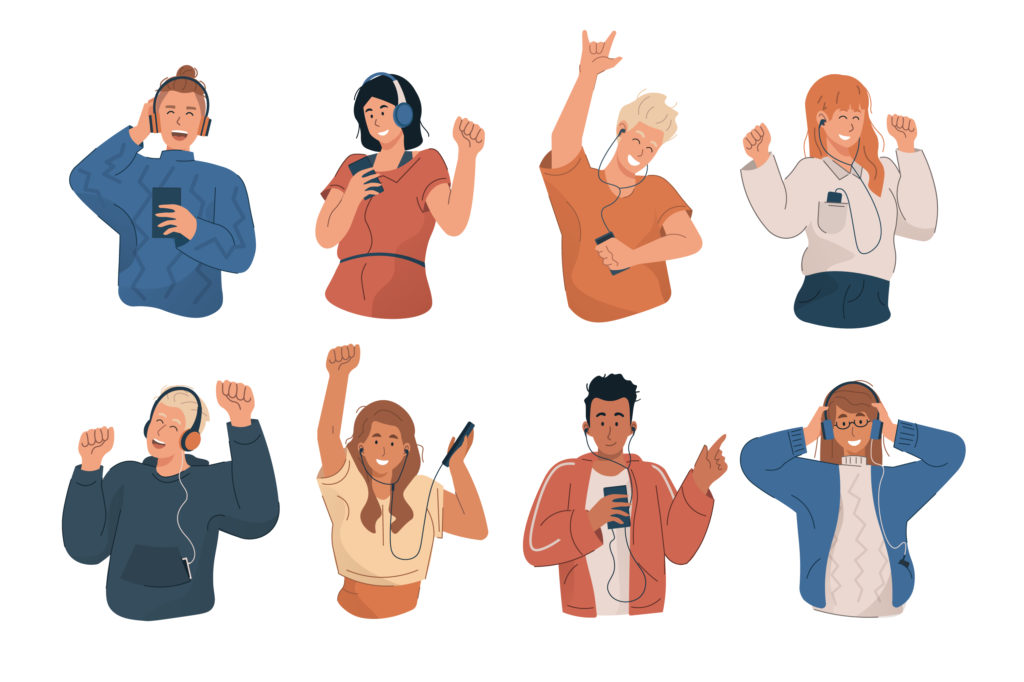
So, if that’s what the data and our brains are telling us, why are so many radio stations doing research like it’s 1989?
If we could see the research spending data across the broadcast radio industry, we’d discover just how much much more money, resources, and efforts are being deployed toward research, scheduling, and brainstorming around music libraries versus talent development, discovery, and training.
Why?
Music is seemingly easier to test. It is simpler to apply “science” – benchmarks, thresholds, averages – to music than it is to even attempt to measure the wild and crazy variables that contribute to making a personality popular, sticky, and worthy of word of mouth on the part of your audience.
 But in 2021, that’s precisely where the futures of so many stations and radio companies rests – on their ability to not only nurture and grow their current cadre of personalities, but to also build and prepare for the future.
But in 2021, that’s precisely where the futures of so many stations and radio companies rests – on their ability to not only nurture and grow their current cadre of personalities, but to also build and prepare for the future.
Understanding your radio station’s chemistry – its DNA – is the key to comprehending its current fate, as well as its future. And as programming veterans know, we have the power to alter the brand and its appeal – if we make the right calculated moves at the optimal time.
Yet, we often spend more time worrying about where the next Nirvana is going to come from – a futile task – rather than concerning ourselves with who will replace our aging morning show. That’s a variable we can control – if and only if we are courageous and aggressive enough to face it head on.
Another music test that turns over the library by 20-somethng percent, while identifying songs that are a bit “crispy” does little to prepare a brand for the road ahead. Even a simple dial test or focus groups that investigate the power of market personalities – on your bench and across the street – might provide more value and ROI at this precarious moment in time.
That’s not to say that music testing isn’t a wise pursuit, because it is. But another library test is akin to an oil change – part of the annual maintenance necessary to keep the station on the air. It is not going to make you a better brand.
Instead, understanding what makes the product special, unique, and built to last – your Brand DNA – provides more lasting and rewarding benefits.
The “Howard Stern Question” is a simple but effective programming litmus test that can help programmers, managers, and owners understand the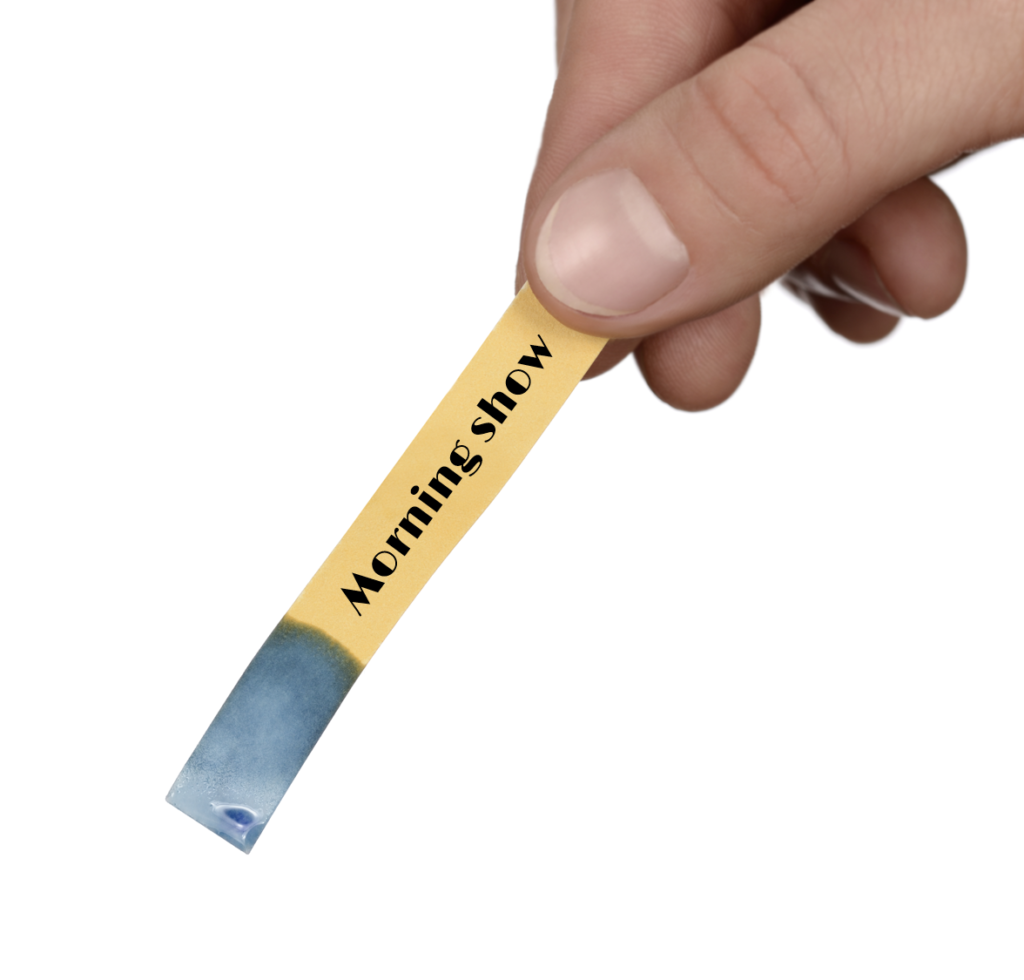 nuances of appeal – why choose your radio station versus all the others entertainment sources?
nuances of appeal – why choose your radio station versus all the others entertainment sources?
Are you a music station without much in the way of talent?
Are you a station with personalities but little else?
Or is your station a successful mashup of music, personalities, and other brand strengths that allows you to grow, evolve, and adapt – whether there’s a pandemic, a hurricane, a school shooting, a local team in the playoffs, or a big tech company decides to build its new headquarters in your metro?
Howard Stern made some lasting contributions to broadcast radio today, 15 years after getting out of Dodge. Yes, his style, demeanor, and humor have been much copied. But one of his many legacies is to help us better understand the formula that drives radio station success in any decade.
Its Brand DNA.
When you learn that, anything’s possible.
- Media And Technology In 2025: Believe It Or Not! - April 18, 2025
- In Radio, You Just Never Know - April 17, 2025
- The Secret To Making A Great Podcast (And Great Radio) - April 16, 2025




Still, over half listen because it’s a habit, it’s free or for the music. I would focus on “its a habit” and how it relates to the future, because many listeners do not care about habits, already know how to connect their phone in the car and will figure out how to hear what they want to hear. In fact after the past year all ages have increased their knowledge of technology to some degree, they had no choice. Going forward, it will be interesting to see if this survey starts to tilt in another direction. All ages have been using smart speakers more, Zoom calls, face timing, streaming and tech knowledge has increased across our population. Add that to newer cars being easier to connect your device and what does say is ahead of us?
Ken, you make good observations. We are tracking the growing use of smart speakers, mobile apps, connected cars, virtual meetings, etc. A key is how broadcast radio can integrate these tools, platforms, and gadgets to its advantage. But it is still about a station’s content – its music, shows, and brand strength. Thanks for engaging on this important topic.
Young people are still listening to FM radio. They especially in the car, but also through their smartphones and smart speakers. Since habit is so important, it seems neccesary for the industry to reinforce this habit. Broadcast radio needs to focus on encouraging the younger generations to listen so that they will carry the listening habit into adulthood and pass it along to their future children. The radio industry must also prepare for the inevitable future of autonomous self driving vehicles. In a car where everyone is a passenger, the doors are wide open for other kinds of entertainment besides audio-only media.
Russell, thanks for the comment. Your argument is well grounded. Maybe a dozen years ago, kids might have been able to avoid the radio. But once they learned to drive, broadcasters had that all-important edge. Today, “connected cars” offer many options, all available on Gen Z’s favorite devices – their phones. And coming automotive technologies won’t make it any easier.
As a 48 year old I still look for the radio personality. A lot of radio stations play automated music without a voice usually during the 7pm – 11pm hours. I believe even today that the dj makes the station and not necessarily the music!
Thanks for the comment, Joe.
Excellent thought generator. Style, curation, connection with the audience. Build it and they will come. Thank you, Fred.
Thanks, Clark. Appreciated.
Two more….
Which “Stern” stations stayed in their format after he left? Only one.
Two ….ask a focus group if they have ever entered a radio station contest? Most will say no. Change the question to “Most people have entered radio station contests, which one have you entered? 90% will raise their hands and say that they still have the prize!!
Um….KISW, WNCX…let me get back to you with the rest.
That’s a fascinating insight, Walter. A reminder that it’s not just about asking the right questions, but asking the right questions in the right way–the way that will extract the most accurate, useful information. Good comment.
The data Fred presents uncovers an uncomfortable truth.
With all the playlisting technology available on the user end, “seemingly everyone has become a music radio programmer.” Employing super engaging local talent can be messy. They don’t just passively rotate like songs. They need to be fed, and that may include their egos.
But the ratings and revenue potential rewards of nurturing personalities who are more than passive wallpaper, can be great. Indeed, they may be what listeners find most alluring in your Station’s DNA, as more and more competing sources become “easy to listen to in the car.”
Paul, it is clearly more difficult to research great personalities, much less nurture and collaborate and grow with them. And oftentimes, the very best are the most difficult to manage. That’s true in all walk of life, from entertainment to sports to politics.
When I got the teaser e-mail, my first thought before opening the column to read was “content, content, content”. Howard Stern was all about content, and any successful personality at any point over the years (regardless of format) was about content. Don Imus was all about being a curmudgeon, sarcasm, and borderline mean-spirited gags. Wink Martindale was all about artist bio information (in his heyday at KMPC, his “instant specials” were legendary). Dr. Don Rose was just plain silly, even to the point of laughing at his own stupid jokes. In the same way, today’s personalities have to find what their own unique comfort level is and what content fits them.
Your litmus test is well thought out, Fred. But the difficulty is still trying to measure something like personality which is qualitative rather than quantitative.
KM, you’re right. The question only measures the relative value of a host – not their actual contribution. But it’s a litmus test question that allows stations to understand how their brands are perceived. In a perfect world, of course, you want people to answer “BOTH” – they are fans of both the station and the personality. Appreciate the comment.
Interesting, why don’t more celebrities take over the airwaves like Stern did if personalities drive so much? I would think a very popular star would garner the same ratings as Stern over time but nobody else seems to come close.
It is much harder than it looks. Just ask Whoopie Goldberg, David Lee Roth, and other celebs who flamed out on radio.
Please help!!! As a music fan commercial fm radio is unlistenable. Scroll through the dial in any market and you hear the same playlist over and over. You would think many superstar bands i.e Fleetwood Mac Eagles Elton John etc etc etc have only 2 or 3 songs in their entire careers. To describe it as boring and unimaginative is an understatement. Thank God for satellite radio.
Mark, you made my day.
Seriously, sad to hear broadcast radio’s not doing it for you. And your comment is a reminder to all of us in radio that a) consumers like you have many options, and b) FM radio will have a continued tough time competing against streaming, satellite, etc.
Why can’t stations have a bigger playlist than only 100 or 200 songs that rotate and play over and over again!?
That IS the question.
Nice article Fred. Thought provoking, timely and true. It is very difficult to find great radio air talent (the usual Aircheck etc way) and has been for a couple decades now. Yet it is staggering how many incredible ‘nobodies’ are super talented doing Youtube videos out of their bedrooms, and LOTS of them. Clearly smart, creative, decent voices, great presentation and mic skills, understand humor, serving up lots of interesting info, get editing, ‘hooks’, teasing, and all that. Yet, seemingly untapped completely.
It would seem, and maybe this is just way too logical. If you’re a radio station up against a giant mainstream streamer that has billions and billions of dollars in advertising, net presence, custom web coders/algorithms, public stock AND profit, and they’re throwing all of that at you daily….the last thing you’d want to be competing on is music; the main thing they do. Does that seem right to you? Versus, your air talent that if good, are almost impossible to duplicate digitally.
It’s totally right, Pat, and continued evidence why you’re one of the outstanding practitioners of this craft we call radio. Thanks for summing it up so well.
Radio killed radio. Station owners, managers and eventually big corporations trying to up the bottom line, trimmed back programming staff and costs. Back at radio’s beginning it was always the top talent that brought big results. The personalities that walked off the beaten path always created bigger results. Top radio brass subtracted the personality equation for the almighty buck. DJs were/are a dime a dozen. Bigwigs removed a main ingredient from the pie and gave listeners less to enjoy. The solution is easy. Bring back zany, crazy, spirited, creative entertainers(not shock jocks), pay them as an asset instead of janitor wages, add sparkle and show biz (jingles) and watch people come back to radio.
Ken, I appreciate your POV. For many jocks, it has been a tough road – lots of moves, mediocre pay, and being taken for granted. But many others have been paid handsomely, commensurate with their ability to generate ratings and revenue. Clearly, broadcasters could benefit from rethinking their value, how they’re deployed, and how well they’re compensated. Pat Holiday’s comments above are measured and insightful.
You’re a sharp and very nice guy. This article, which I just read here in my retired ex-pat home since 2014…Santiago, Chile, was very interesting and it just popped up VERY surprisingly in my Google news feed. I enjoyed working with you in Richmond. BUT THE CLASSIC ROCK FORMAT WAS INVENTED BY ME…DICK HUNGATE…ON 1/15/1981 AT WYSP, PHILADELPHIA WHEN I WAS PROGRAM DIRECTOR AND MIDDAYS THERE. #2 STATION E-V-E-R TO DO IT WAS KQRS-FM, MINNEAPOLIS UNDER MY FRIEND, THEIR LATE PD DOUG SORENSON. Ask Bill Weston w/ Beasley @ WMMR and WMGK, Philly…or jocks Mark Goodman, Joe Bonnadonna, Andre Gardner, Pierre Robert, Doug Podell of WRIF fame (their PD for ages, now retired)….or your global competitors Jeff Pollack and Tommy Hadges w/ Pollack Media.
By the way, great research, great article. It reinforces what many of us in the industry have been saying for a long time, that there is more to radio than just music. Thank you for sharing your survey results